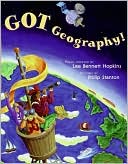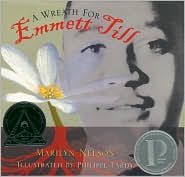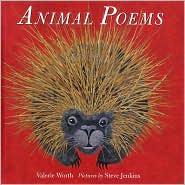One of the things I've noticed during school visits at both the elementary and middle school level is that kids really respond to poetry. The most interesting thing about that? The kids who are the school's "problem" kids often pay the closest attention. They are able to follow long poems such as "Casey at the Bat" by Ernest Lawrence Thayer, and can sort out what's going on in poems with obscure (or nonsense) words in them, such as "Jabberwocky" by Lewis Carroll.
There's no reason that poetry has to be relegated to a one-week unit, assuming that the teacher has time to get to it. And this is because there are poems and poetry collections that fit extremely well into existing school curricula.
 Studying geography? Try Got Geography!, edited by Lee Bennett Hopkins. Studying the planets? Don't miss Douglas Florians Comets, Stars, the Moon, and Mars or And Then There Were Eight by Laura Purdie Salas. Studying explorers or pioneers? Try Trailblazers: Poems of Discovery by Bobbi Katz.
Studying geography? Try Got Geography!, edited by Lee Bennett Hopkins. Studying the planets? Don't miss Douglas Florians Comets, Stars, the Moon, and Mars or And Then There Were Eight by Laura Purdie Salas. Studying explorers or pioneers? Try Trailblazers: Poems of Discovery by Bobbi Katz. Studying Civil Rights? Try A Wreath for Emmett Till or Sweethearts of Rhythm: The Story of the Greatest All-Girl Swing Band in the World by Marilyn Nelson, Miss Crandall's School for Young Ladies and Little Misses of Color by Elizabeth Alexander and Marilyn Nelson, Birmingham 1963 or Becoming Billie Holliday or Dear Mr. Rosenfeld by Carole Boston Weatherford.
Studying Civil Rights? Try A Wreath for Emmett Till or Sweethearts of Rhythm: The Story of the Greatest All-Girl Swing Band in the World by Marilyn Nelson, Miss Crandall's School for Young Ladies and Little Misses of Color by Elizabeth Alexander and Marilyn Nelson, Birmingham 1963 or Becoming Billie Holliday or Dear Mr. Rosenfeld by Carole Boston Weatherford. Studying animals and/or habitat? Try Valerie Worth's Animal Poems, illustrated by I.N.K. blogger Steve Jenkins, The Seldom Ever Shady Glades by Sue Van Wassenhove, If Not for the Cat by Jack Prelutsky, Vulture View by April Pulley Sayre (again illustrated by Steve Jenkins), Feathers by Eileen Spinelli, The Company of Crows by Marilyn Singer, The Cuckoo's Haiku: and Other Birding Poems by Michael J. Rosen, or Mites to Mastodons by Maxine Kumin (or one of many more books on the topic).
Studying natural science? By all means, pick up one of these books by Joyce Sidman: Ubiquitous, Dark Emperor: And Other Poems of the Night, Song of the Water Boatman, Butterfly Eyes: And Other Secrets of the Meadow. Or try something like Shape Me a Rhyme by Jane Yolen or Chatter, Sing, Roar, Buzz: Poems About the Rain Forest by Laura Purdie Salas.
 Interested in studying biographies? There's Twelve Rounds to Glory: The Story of Muhammad Ali by Charles R. Smith, Jr., Your Own, Sylvia: a verse portrait of Sylvia Plath by Stephanie Hemphill, The Poet Slave of Cuba: A Biography in Poems of Juan Francisco Manzano by Margarite Engle, Becoming Billie Holliday by Carole Boston Weatherford, Eureka! Poems About Inventors by Joyce Sidman, or Jazz ABZ by Wynton Marsalis (biographies of jazz greats).
Interested in studying biographies? There's Twelve Rounds to Glory: The Story of Muhammad Ali by Charles R. Smith, Jr., Your Own, Sylvia: a verse portrait of Sylvia Plath by Stephanie Hemphill, The Poet Slave of Cuba: A Biography in Poems of Juan Francisco Manzano by Margarite Engle, Becoming Billie Holliday by Carole Boston Weatherford, Eureka! Poems About Inventors by Joyce Sidman, or Jazz ABZ by Wynton Marsalis (biographies of jazz greats).Is it history you're after? Try The Brothers' War: Civil War Voices in Verse or VHERSES: A Celebration of Outstanding Women by J. Patrick Lewis or America at War, edited by Lee Bennet Hopkins
The point is that for nearly any area of study, a poetry collection can be found that relates to it. And it should be found, because kids who have a hard time sitting still for prose lectures pay attention really well to poems. I suspect it's because of the use of lots of imagery and active verbs, the rhythm and, when used, rhyme, that grabs and holds the attention of kids who don't or can't always listen to prose.

3 comments:
Kelly, great roundup. Wow! I'm going to share this with teachers.
Thanks April!
Such a wonderful list of titles for teachers to use. Thanks!
Post a Comment